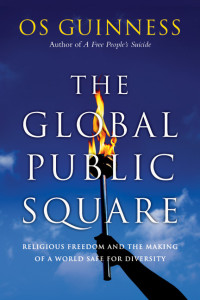 The Global Public Square: Religious Freedom and the Making of a World Safe for Diversity
The Global Public Square: Religious Freedom and the Making of a World Safe for Diversity
By Os Guinness
My rating: 4 of 5 stars
“Everyone has the right to freedom of thought, conscience and religion; this right includes freedom to change his religion or belief, and freedom, either alone or in community with others and in public or private, to manifest his religion or belief in teaching, practice, worship and observance.” The Universal Declaration of Human Rights, Article 18.
Os Guinness has penned this extended argument as both defense of and elaboration of how this statement passed in the United Nations in 1948 might shape the public squares of our countries nearly 70 years later, in a climate where this “first freedom” may be less enjoyed now than in 1948. Guinness argues here not for the privileging of any religion, or merely for religion at all. Rather his basic argument is that freedom is conscience is one of the things that defines us as human beings. He would argue this applies equally to the atheist and the materialist, as it does to any religious believer and that the compromise of this freedom, by the state or by competing belief systems, weakens this freedom not just for those immediately attacked but for all. Therefore, Guinness argues for neither a sacred public square, privileging a particular religion, nor a naked public square, banishing all religious belief from public discourse, but rather a civil public square where diverse beliefs, religious and secular, might listen and seek to persuade one another with regard to the well-lived life and the well-ordered society.
Guinness expresses grave concern over the impairing of the freedom of conscience in various parts of the world. His concern is not simply the forced conversions of religious believers in parts of Africa and the Middle East or the continuing persecution of religious believers in Communist countries. He equally, and especially has concern for the West, and what he sees are incursions on the singular freedoms of speech and conscience enshrined in documents such as our Bill of Rights. He would argue that mandates in health care laws that force religious organizations to provide abortion and other medical benefits contrary to their faith are such an infringement, as are the bans of religious groups on university campuses who “discriminate” because they require leaders (not participants) to affirm the religious beliefs of the group. He argues that while such impairments of liberty may not affect most of us, we may be witnessing a “death of a thousand cuts.” Each chapter concludes with this peroration:
It is time, and past time, to ponder the question. What does it say of us and our times that the Universal Declaration of Human Rights could not be passed today? And what does it say of the future of freedom of thought, conscience, religion and belief if it can be neglected and threatened even in the United States, where it once developed most fully-that it can be endangered anywhere? Who will step forward now to champion the cause of freedom for the good of all and for the future of humanity?
Guinness has not left this task to others. In addition to this book, and his recent A Free People’s Suicide which I reviewed earlier this year, Guinness helped draft the Global Charter of Conscience, published in Brussels at the European Parliament in June of 2012. It articulates both the inherent rights of freedom of conscience and the necessary responsibilities any society must undertake to sustain that right.
Some might think this either unnecessary fear-mongering on one hand, or impossible idealism on the other. My own sense is that it is a clarion-call alerting us to not take for granted the singular freedoms we have enjoyed in the west and a well-thought out proposal for extending these freedoms in contextually appropriate ways throughout the world.
A friend of mine who is an ancient historian observed that violence, the execution of enemies of a different faith, and the forced conversion of women and children has been the way of the world throughout most of human history. The experience of freedom of speech and conscience of the last few centuries in the West, with all its problems and limits, has been a singular space of civility in a brutal world. If Guinness is right (and I think he is) the choice before us is whether to protect and seek to extend that civil space or to revert to the brutality that is characteristic of most of humanity through most of history that quashes the very thing that makes us most deeply human, our freedom of thought and conscience.
Thank-you to Bob for sharing The Global Public Square: Religious Freedom and the Making of a World Safe for Diversity from his blog Bob on Books. Today, please take a few minutes to join me in considering the Campus Access Concerns of the previous calendar year and praying for discernment as InterVarsity enters the second half of the academic year.
Note: Below is a short video in which Greg Jao, InterVarsity National Field Director – Northeast, addresses the Campus Access Challenges in the California State University System. ~ Thomas B. Grosh IV, Associate Director, Emerging Scholars Network
Bob Trube is a former Associate Director of Faculty Ministry and Director of the Emerging Scholars Network. He blogs on books regularly at bobonbooks.com. He resides in Columbus, Ohio, with Marilyn and enjoys reading, gardening, choral singing, and plein air painting.

Leave a Reply